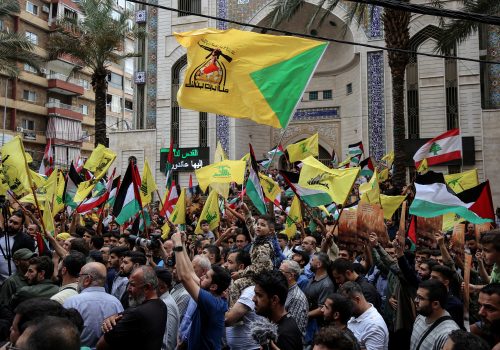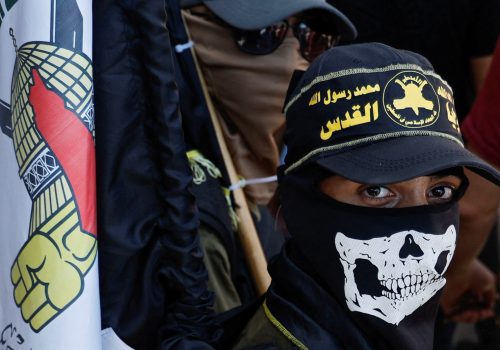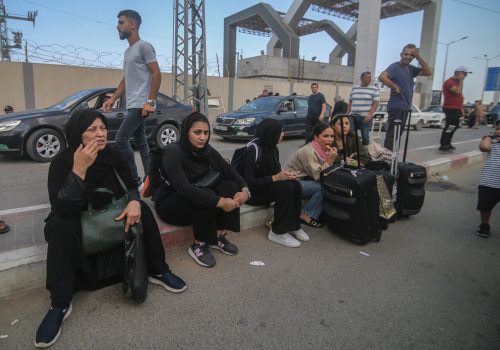Hamas’s actions are war crimes. Israel should not respond with further war crimes.
Hamas’s attacks in Israel on October 7 and Israel’s response in the Gaza Strip have been war crimes met with more apparent war crimes. International humanitarian law (IHL), or the law of war, is clear that targeting or indiscriminately attacking civilians is prohibited, and parties must take precautions to protect civilian life when pursuing legitimate military aims. There are clear indications that both Hamas and the Israeli Defense Forces (IDF) have violated IHL, and some of their attacks constitute grave violations, amounting to war crimes and crimes against humanity.
This piece discusses provisions of IHL and international criminal law as they apply to the ongoing Israel-Hamas conflict. While events are developing rapidly, continued loss of civilian life looks all but guaranteed. Hamas and Israel must change their tactics to halt the continued commission of war crimes and crimes against humanity.
Jus ad bellum versus jus in bello
Before discussing Hamas’s and the IDF’s conduct in war (jus in bello or IHL), it is worth briefly discussing the legality of going to war (jus ad bellum). International law treats these two issues separately. Jus ad bellum provides that the use of force itself is prohibited except in certain circumstances, including self-defense. But once a conflict has begun, all parties must abide by jus in bello or IHL. In other words, any war—started legally or illegally—must abide by IHL.
IHL has four basic principles that seek to minimize the impact of war on civilians and non-combatants. Humanity refers generally to restraint in and limiting war’s impact on human security and health. Distinction refers to the obligation to differentiate between civilians and civilian objects as well as combatants and military objects. This principle prevents targeting civilians and indiscriminate attacks that fail to distinguish between civilians and military objectives. Proportionality provides that even where attacks target military objectives, they cannot cause civilian harm that is “excessive in relation to the concrete and direct military advantage anticipated.” While there is no calculation for what constitutes excessive harm, IHL is clear that in every attack, the expected concrete and direct military advantages must outweigh any collateral loss of life or harm to civilians. Finally, military necessity recognizes that a legitimate military objective is to weaken the capacity of opposing parties and win a battle or war, though this objective must be exercised in accordance with IHL principles intended to minimize harm.
IHL applies in all conflicts at all times, regardless of the perceived justness of the conflict or the conduct of other parties. Violations of IHL by one party do not justify violations of IHL by other parties.
Hamas’s massacres in Israel
Hamas’s attacks on Israel commencing on October 7 are clear violations of IHL. The assault began with Hamas firing thousands of rockets indiscriminately into Israel, failing to distinguish between civilian and military locations or minimize impact on civilians. The rocket fire, which continues, has impacted civilian locations, including a hospital and homes, and killed civilians. Indiscriminate attacks are clear violations of IHL and amount to war crimes.
Under the cover of rocket attacks, Hamas fighters stormed into Israel and massacred more than 1,300 people, mostly civilians, in their homes, in towns, and at an outdoor music festival, shooting them dead on the spot as they attempted to flee, hid, and begged for their lives. More than 3,300 others were injured. These targeted attacks on civilians are clear violations of IHL that amount to the war crimes of willful killing and torture. Given the widespread and systematic nature of the assault, these attacks likely also constitute crimes against humanity of murder and torture.
Hamas and other militants also kidnapped and brought 199 people back to Gaza, primarily civilians, including children. Hamas has threatened to kill these individuals if Israel’s assault on the Gaza Strip continues. Hostage-taking—abduction or detention of persons with a threat to kill, injure, or continue detention in order to compel a third party to do or abstain from an action to secure the release of the hostages—violates IHL and is a war crime. Any execution, torture, or cruel or inhumane treatment of hostages by Hamas would further constitute war crimes.
There are also reports that Hamas is using Israeli hostages and Palestinian civilians as human shields in Gaza—using civilians or protected persons to render areas immune from military operations. If true, this violates IHL and is a war crime.
Israel’s retaliation against Hamas and across Gaza
Within hours of Hamas’s violent assault on Israel on October 7, the IDF responded with airstrikes in Gaza targeting Hamas. Israeli leaders vowed to retaliate against Hamas with full force, to “reach into every place Hamas is hiding” and turn those locations into ruins. The United States and other countries quickly pledged to support Israel in its efforts to “defend itself and protect civilians from indiscriminate violence and terrorism,” per Secretary of Defense Lloyd Austin’s statement.
But Israel’s actions across Gaza have not been limited to self-defense. Israel’s acts are intended to “forcefully avenge,” and the IDF’s claim that Hamas “is responsible for EVERYTHING that happens in Gaza” clearly abdicates the IDF’s obligation to follow the laws of war. This apparent intent to seek vengeance and disregard the laws of war raises concerns that the IDF is violating IHL and committing war crimes and crimes against humanity.
The IDF has launched thousands of strikes across Gaza, killing at least 2,800 people—more than 60 percent women and children—and injuring more than 10,850 as of October 16. These strikes have impacted civilians and specifically protected locations, including hospitals, markets, refugee camps, mosques, educational facilities, and entire neighborhoods. Many of these attacks appear to be indiscriminate, and IDF spokesperson Rear Admiral Daniel Hagari confirmed on October 10 that “the emphasis is on damage and not on accuracy.”
The IDF also appears to be failing to take necessary precautions to protect civilian life, for instance, by providing warnings before attacking civilian locations, a practice Israel has utilized in prior conflicts. While some Israeli officials say Israel complies with international law, indiscriminate attacks on densely populated civilian areas and attacks lacking precautions violate IHL and likely amount to war crimes. When carried out systematically or in a widespread manner, they may constitute crimes against humanity. Any violations by Hamas, such as using human shields, neither removes protection from civilians nor does it lessen the IDF’s obligation to follow IHL and protect noncombatants.
In addition to airstrikes, on October 9, Israeli Defense Minister Yoav Gallant ordered a “complete siege” of Gaza, ensuring “no electricity, no food, no fuel” or anything else—such as humanitarian aid and workers to treat the thousands of casualties—would enter Gaza. Gaza now lacks electricity and water, and hospitals are stretched thin during unprecedented violence. The situation continues to deteriorate, and civilians cannot leave given that the two border crossings into Israel are closed, and the IDF has bombed the Rafah crossing into Egypt. The inability to reach a deal for its opening has been blamed on Hamas, Israel, and Egypt.
A full siege of a civilian population—implemented in response to Hamas’s holding Israelis hostage—violates IHL and likely amounts to the war crime of collective punishment. Claims to the contrary misstate longstanding IHL, which is clear in its requirement that civilians be excepted from a siege. Israel’s own military manuals recognize that civilians must be allowed to leave a besieged area or receive food, water, and humanitarian aid. If the siege causes starvation and/or deaths of civilians, it would likely amount to the war crime of starvation as a method of warfare and crimes against humanity of inhumane acts and murder.
Israel is also preparing to launch a ground invasion into Gaza and demanded on October 13 the evacuation of 1.1 million residents in northern Gaza within 24 hours (the period has since expired). This evacuation order—of half of Gaza’s majority children and elderly population, amid a full siege that is blocking the entry of fuel and exit of persons and an ongoing conflict that has caused significant injury, damaged roads and infrastructure, and even killed those trying to comply with the order—has been described by Médecins Sans Frontières and the World Health Organization as “outrageous,” “as absurd as it is intolerable,” and “tantamount to a death sentence.” It also prompted an exceptional statement by the International Committee of the Red Cross warning of “catastrophic humanitarian consequences.” The order and subsequent displacement of people violate IHL and likely constitute the war crime and crime against humanity of forcible transfer. The order also raises the specter that the IDF will treat civilians who do not leave northern Gaza as combatants, resulting in additional civilian casualties.
The path forward requires accountability for all atrocities
It’s hard to imagine how Israeli victims and their families will recover from the horrific massacre on October 7 or how Palestinians will survive the ongoing bombardment and siege and recover from the increasing tragic loss of life. Still, the dust will settle at some point, and bullets and bombs will stop. At that point, accountability will be key to moving forward and an essential component of any political solution to escape the “impunity-fueled repression and cycles of bloodshed” that have become all too familiar in the Gaza Strip and Israel. On October 11, Israel’s representation at the United Nations recognized the need to ensure accountability for Hamas’s violations, and Palestine’s representation demanded the just and equal application of international law to protect its citizens. Both authorities should ensure that their forces are held accountable for violations. Where they fail to do so, the International Criminal Court must exercise its jurisdiction over war crimes and crimes against humanity committed in the Gaza Strip and by Hamas.
Elise Baker is a staff lawyer with the Atlantic Council’s Strategic Litigation Project. Previously, she worked at the United Nations International, Impartial and Independent Mechanism on Syria and led Physicians for Human Rights’ Syria Mapping Project, which documented attacks on Syria’s health care system.
Further reading
Wed, Oct 11, 2023
Hamas’s attack on Israel was straight out of Hezbollah’s playbook
MENASource By David Daoud
The genesis of Operation Al-Aqsa Flood appears to originate with Hezbollah, at least in part. The pressing question now is what will Hezbollah do next?
Tue, Oct 10, 2023
Hamas’s attack underscores the need for US and Israeli policy to change course
MENASource By
Both Israel and the United States should engage in deep introspection at the policy level over their failure to deter Hamas’s brutal attack.
Sat, Oct 14, 2023
Egypt cornered over Israel’s war on Hamas
MENASource By Shahira Amin
Whether Egyptian President Abdel Fattah el-Sisi will bow under US and Israeli pressure remains to be seen.
Image: Palestinians look for survivors under the rubble of a building following an Israeli airstrike in Gaza City on October 15, 2023. (Photo by Majdi Fathi/NurPhoto)


